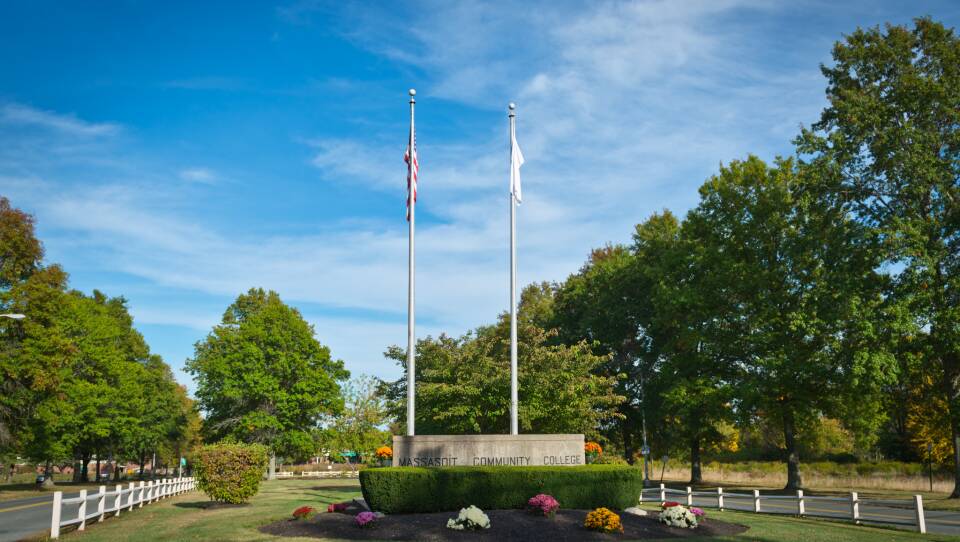For the first time in Massachusetts, a community college will offer a degree in Black Studies.
Beginning this fall, Massasoit Community College in Brockton will become the first two-year school in the state to offer such a degree just as political leaders in other, more conservative states are questioning the value of African American studies.
In these polarizing social and political days, Massasoit administrators said the goal is to explore the rich history, culture, and contributions of Black people in America and to provide culturally responsive education to a majority-minority community.
“We've been charged with creating more engaging curriculum,” said Dr. Carine Sauvignon, an executive dean at Massasoit. “The hope is that students recognize this program and its worth dealing with social justice issues, learning about Black experience in cultures and civic engagement.”
Only a handful of community colleges in the United States offer degrees in Black studies, with several of them located in California and one in Philadelphia.
The two-year program at Massasoit will offer courses about the African American experience, ranging from Black history, literature and music to how Black communities experience contemporary issues like education, healthcare and criminal justice.
The new offering at Massasoit comes as political leaders in other states are attempting to limit diverse curricula.
In Florida, for example, Republican Governor Ron DeSantis recently defended his administration’s decision to restrict students’ access to a new AP course on African American studies. Last year, his administration had determined that the class “significantly lack[ed] educational value.”
On Monday, speaking at a press conference in Jacksonville, DeSantis said he supports banning the course because its lessons might cover such topics as queer studies and abolishing prisons.
Despite calls from Black leaders and educators to reverse the administration’s decision, DeSantis stood by it.
“When I heard it didn’t meet the standards, I figured, yeah, they may be doing CRT,” DeSantis told reporters on Monday. “It’s way more than that.”
The College Board, the organization that is offering the course to more than 60 schools in the country as a pilot program, has fiercely defended its curriculum, saying it was developed over a 10-year period and peer reviewed.
The Bay State's unique role
Massachusetts has long been a leader in this educational space. More than 50 years ago, in 1969, Brandeis University created one of this country’s first Black studies departments.
Chad Williams teaches history and Afro-American at the university in Waltham, Mass., and said the emerging program at Massasoit marks another milestone for the state.
“Massachusetts has a very rich history when it comes to the creation of Black studies,” Williams said, noting that Harvard, Boston University and dozens of other four-year colleges followed Brandeis’s lead in the 1970s. “But for this to happen at the community college level is very significant. This is important recognition of their constituency and listening to their needs.”
Williams pointed out that oftentimes community colleges like Massasoit serve a disproportionate number of Black and brown students and tend to steer them toward more traditional disciplines, vocations and studies that are deemed “more practical” than a degree in Black Studies. But he said it’s increasingly important at the community college level to expose students to a broad range of ideas.
“And Black Studies is really the ideal way in which to do that because it’s inherently interdisciplinary,” he said. “Student will be exposed to history, literature, politics and the arts.”
Williams commended Massasoit for being “courageous” in launching this program at time when the field of Black studies is under attack from conservative politicians. He pointed out it’s not the first time this academic discipline has garnered scrutiny.
“The creation of Black studies was challenged by people who felt it had no valid intellectual contributions,” Williams, a historian by training, recalled. “Black studies has always been insurgent. It’s always been a challenge to mainstream ways of thinking.”
Massasoit administrators said the goal is to enroll at least 15 students in the new degree program this fall, and the community college is working out transfer agreements with four-years colleges, including the University of Massachusetts Boston, Boston University and historically Black colleges and universities.
Pitching the program, Massasoit’s Carine Sauvignon said race and ethnic studies are not just for students from particular demographic groups.
“Everyone should be taking these subject matters,” she said. “It opens up and broadens knowledge and understanding of cultural differences that we experience, especially in higher education.”
With race-conscious admissions and diversity, equity and inclusion efforts under attack, Sauvignon said it’s crucial that educators not fear or run away from these issues, but rather that they “embrace them and incorporate them into our daily lives so that we can be a better society.”









